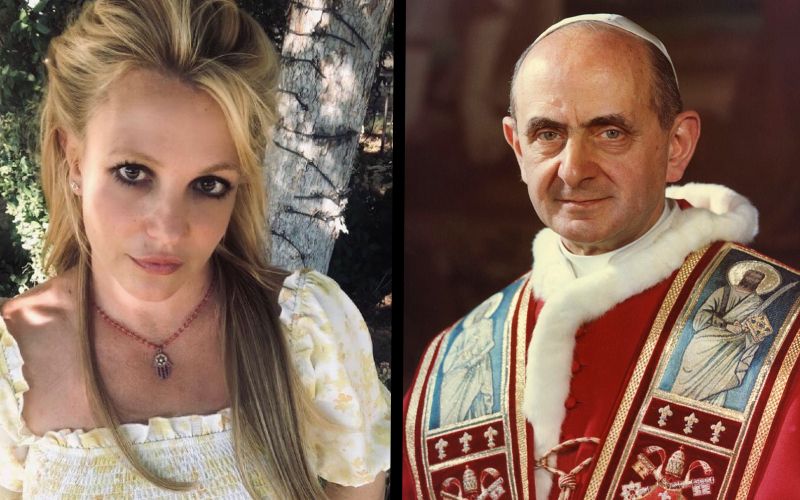This article originally appeared in the National Catholic Register.
In another win for “conspiracy theorists,” the #FreeBritney crowd was proven correct by the Princess of Pop’s recent testimony calling for an end to her alleged conservatorship abuse.
“Conservatorship” is a legal term for granting a court-appointed trustee control of a person’s finances and other personal matters.
James “Jamie” Spears (Britney Spears’ father) became her conservator after her 2008 public breakdown.
This arrangement is usually reserved for people who cannot manage their own affairs due to disability, old age, or mental impairment — not for a person who produces four albums, judges The X Factor, and choreographs and stars in her own Las Vegas show.
Spears’ fans became convinced in 2019 that her caretakers coerced her to remain in the conservatorship so that they could profit from her $70 million fortune.
This resulted in the #FreeBritney movement, which garnered support from thousands of fans and celebrities, but was largely dismissed as a conspiracy theory — until her June 23 court hearing.
Spears broke her silence in an impassioned testimony during the hearing to end her father’s control over her life.
She made disturbing allegations about her treatment, including that she was forced to take lithium, was confined to her home, was forced to work intensive 10-hour days without vacation, and forbidden from removing her IUD to try for another child.
“I want to be able to get married and have a baby,” Spears said in her testimony.
“I was told right now in the conservatorship, I’m not able to get married or have a baby. I have an [IUD] inside of myself right now so I don’t get pregnant. I wanted to take the [IUD] out so I could start trying to have another baby.
“But this so-called team won’t let me go to the doctor to take it out because they don’t want me to have children — any more children.”
If these allegations are true, it’s symptomatic of the culture of objectification Pope St. Paul VI predicted artificial birth control would create.
He wrote in the 1968 encyclical Humanae Vitae: “Another effect that gives cause for alarm is that a man who grows accustomed to the use of contraceptive methods may forget the reverence due to a woman, and, disregarding her physical and emotional equilibrium, reduce her to being a mere instrument for the satisfaction of his own desires, no longer considering her as his partner whom he should surround with care and affection.”
Though in this case the satisfied desires are financial rather than sexual, Spears’ forced birth control certainly allows the bad-faith actors in her life control in every way possible.
Spears specifically called out her father as the main culprit, and the state of California for failing to protect her.
“The control he had over someone as powerful as me — he loved the control to hurt his own daughter 100,000 percent. He loved it,” she said.
“When I do everything I’m told and the state of California allowed my father — ignorant father — to take his own daughter, who only has a role with me if I work with him–they’ve set back the whole course and allowed him to do that to me.”
Such an accusation echoes another one of Humanae Vitae’s warnings: “Careful consideration should be given to the danger of this power passing into the hands of those public authorities who care little for the precepts of the moral law.”
In addition to the greed possibly undermining her whole situation, there’s also a whiff of eugenics.
Spears’ case isn’t the first in the United States where someone considered mentally unwell was stopped from having children. Her situation reflects that of the 70,000 forcibly sterilized Americans following the 1927 Supreme Court decision Buck v. Bell.
Spears’ claimed birth control coercion created a rare moment of unity between the pro-life and pro-choice sides of the aisle.
While it is clearly contrary to Catholic teaching, coerced birth control also violates the sacred pro-choice value of bodily autonomy, according to Ruth Dawson, principal policy associate at the abortion-advocating Guttmacher Institute.
“Reproductive coercion is reprehensible, no matter what form it takes — including preventing a person from seeking care to remove a contraceptive device from their own body,” Dawson told Refinery 29. “Everyone has the right to make these most intimate of decisions of if and when to have children.”
Though Dawson’s statement is an area of agreement between opposing camps, it is ironic because Planned Parenthood founder Margaret Sanger promoted eugenics, and may have even approved of this element of Spears’ conservatorship on the grounds of her rocky mental health.
Spears concluded her testimony with a plea for her humanity to be recognized.
“I feel ganged up on and I feel bullied and I feel left out and alone. And I’m tired of feeling alone,” she said. “I deserve to have the same rights as anybody does, by having a child, a family, any of those things, and more so.”
This article originally appeared in the National Catholic Register.
Follow ChurchPOP:
Telegram Channel
GETTR
Gab
Parler
Signal Group
WhatsApp Group 1
WhatsApp Group 2
ChurchPOP Facebook Group
[See also: The 3 Prophesies of Pope St. Paul VI that Are Being Fulfilled In Our World Right Now]
[See also: 6 Reasons This Evangelical Was Convinced ‘Humanae Vitae’ Is Right]


